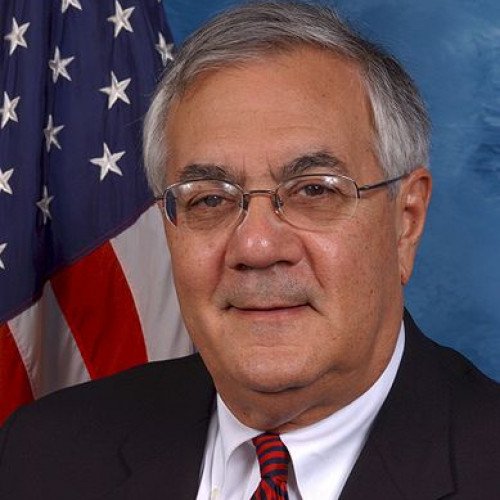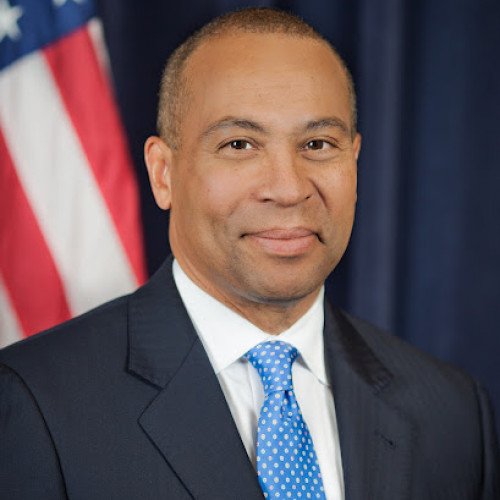Barney Frank VS Deval Patrick

Barney Frank
Barnett Frank (born March 31, 1940) is an American former politician. He served as a member of the U.S. House of Representatives from Massachusetts from 1981 to 2013. A Democrat, Frank served as chairman of the House Financial Services Committee (2007–2011) and was a leading co-sponsor of the 2010 Dodd–Frank Act, a sweeping reform of the U.S. financial industry. Frank, a resident of Newton, Massachusetts, was considered the most prominent gay politician in the United States during his time in Congress.Born and raised in Bayonne, New Jersey, Frank graduated from Bayonne High School, Harvard College and Harvard Law School. He worked as a political aide before winning election to the Massachusetts House of Representatives in 1972. He was elected to the U.S. House of Representatives in 1980 with 52 percent of the vote. He was re-elected every term thereafter by wide margins. In 1987, he publicly came out as gay, becoming the first member of Congress to do so voluntarily. From 2003 until his retirement, Frank was the leading Democrat on the House Financial Services Committee, and he served as committee chairman when his party held a House majority from 2007 to 2011. In July 2012, he married his long-time partner, James Ready, becoming the first member of Congress to marry someone of the same sex while in office. Frank did not seek re-election in 2012, and retired from Congress at the end of his term in January 2013. A biography of Frank was published in 2015.
Statistics for this Xoptio

Deval Patrick
Deval Laurdine Patrick (born July 31, 1956) is an American politician, civil rights lawyer, author, and businessman who served as the 71st governor of Massachusetts from 2007 to 2015. He was first elected in 2006, succeeding Mitt Romney, who chose not to run for reelection to focus on his presidential campaign. He was reelected in 2010. He was the first African American Governor of Massachusetts. A Democrat, Patrick served from 1994 to 1997 as the United States Assistant Attorney General for the Civil Rights Division under President Bill Clinton. He was briefly a candidate for President of the United States in the 2020 U.S. presidential election. Raised largely by a single mother on the South Side of Chicago, Patrick earned a scholarship to Milton Academy in Milton, Massachusetts in the eighth grade. He went on to attend Harvard College and Harvard Law School, where he was president of the Harvard Legal Aid Bureau. After graduating, he practiced law with the NAACP Legal Defense and Educational Fund and later joined a Boston law firm, where he was named a partner at age 34. In 1994, Bill Clinton appointed him as the United States assistant attorney general for the civil rights division of the United States Department of Justice, where he worked on issues including racial profiling and police misconduct. During his governorship, Patrick oversaw the implementation of the state's 2006 health care reform program which had been enacted under Mitt Romney, increased funding to education and life sciences, won a federal Race to the Top education grant, passed an overhaul of governance of the state transportation function, signing a law to create the Massachusetts Department of Transportation, increased the state sales tax from 5% to 6.25%, raised the state's minimum wage from $8 per hour to $11 by 2017, and planned the introduction of casinos to the state. Under Patrick, Massachusetts joined the Regional Greenhouse Gas Initiative (RGGI) in an effort to reduce greenhouse gas emissions. Shortly after Patrick's second term began on January 6, 2011, he declared he would not seek re-election in 2014.Patrick is a managing director at Bain Capital and serves as the chairman of the board for Our Generation Speaks, a fellowship program and startup incubator whose mission is to bring together young Israeli and Palestinian leaders through entrepreneurship. He also holds a Board of Directors position at telehealth company American Well.Members of his own inner circle and Barack Obama's inner circle encouraged Patrick to run for president in 2020, but Patrick ruled out a 2020 presidential bid in December 2018. In November 2019, however, uneasy about the existing field of Democratic candidates, Patrick was reported to have called a few leading Democrats and allies to say that he would soon announce a 2020 presidential bid. He formally entered the race on November 14, 2019. He ended his campaign on February 12, 2020, following a very poor showing in the Iowa caucus and the New Hampshire primary.